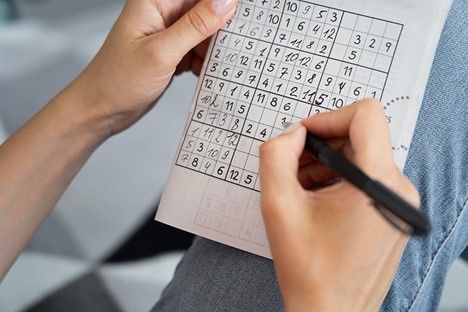As you get older, you’ll notice more people and organizations urging you to do brain exercises to ward off memory loss and other age-related issues of the mind. How can you determine what’s effective, not just pseudo-science? While you don’t need to download specific apps or buy any equipment, here’s what you need to know about exercising your brain and how to do it right.
The Science Behind Training Your Brain
Researchers have conducted many studies to see if certain training activities can change your brain. The results have been mixed. There is little evidence to suggest that applications or specific puzzles can keep people from developing dementia. However, brain training isn’t harmful. It just isn’t as effective as people had hoped.
That doesn’t mean there aren’t science-backed things you can do to keep your mind sharp and your cognitive function high. Brain exercises are more straightforward than you might imagine.

5 Ways To Exercise Your Brain
Keeping your mind engaged is the best way to maintain working memory and cognitive function. Here are five ways you can exercise your brain:
- Play games regularly on your own and in a group. Chess, sudoku, scrabble, and word puzzles are all great options.
- Listen to music to enjoy therapeutic and cognitive benefits. Play your favorites and also try new artists from time to time.
- Tend a garden. Whether it’s a window box of herbs and spices or a community space of flowers and vegetables, gardening is great for the brain.
- Keep a journal or write letters. Writing is an effective way to engage your memory and cognitive skills.
- Do an art project. Stretching the creative part of your brain can help you stay alert and engaged in daily life. Plus, making art is satisfying and can improve mental health.
Incorporate these activities into your life daily or weekly to give your neurons a workout. To make it even more meaningful, include your grandchildren, neighbors, or young people you mentor.
Tips for Cognitive Wellness
Brain exercises are fun and effective, but you must make healthy lifestyle choices to keep your cognitive abilities stable and normal. Physical activity is just as important as mental activity, so develop a safe and appropriate exercise routine that you can complete at least every other day. Walking, dancing, chair workouts, and at-home exercises are all excellent options for older adults.
Sleep and nutrition are other factors that impact brain health. Not getting enough sleep can result in brain fog and reduced cognitive function, so it’s important to rest well at night. For your meals, consider following the MIND diet, which has been shown to help boost brain health. If you haven’t already, quit smoking and limit your alcohol intake, as both of these habits have adverse effects on the body and mind.
Joining an Active Community of Older Adults
Isolation and loneliness can be detrimental to mental and cognitive health. If you’re looking for ways to stimulate your mind and body while meeting other like-minded people, joining a community of active older adults might be the solution. Schedule a visit to our active older adult community to learn more about the amenities and programming our residents enjoy.




















